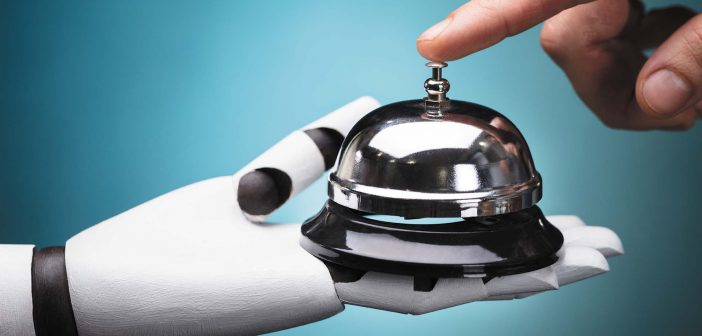Technology visionaries: Interviews with tech gurus
by Christopher Curry
Technology has created a modern hotel experience that would have seemed far-fetched just a few years ago.
Kevin Spruill, the vertical programs manager for hospitality at fiber internet and managed Wi-Fi provider Spectrum Enterprise, offers a scenario to show the drastic changes. Guests forgo the front desk and use their mobile-phones for check-in, a room key, check-out, and payment. At the hotel, data in the customer retention management system on guest preferences during prior visits craft a more personalized stay. “Capturing that data for a hotelier is key,” Spruill says. “You want to know what Kevin Spruill likes when he checks into his room, whether it is two bottles of water or two bottles of IPA, with a room temperature set at 70 degrees and ESPN popping up on the TV when he enters the room.”
From newspapers to music to retail, rapid advancements in technology have significantly transformed many major industries in recent years. The hotel industry is in the midst of its own transformation.
Hoteliers need to embrace and implement technology-driven solutions to stay competitive in the modern market. But, that may be easier said than done in an industry that has historically been slow to adapt to cutting edge advancements.
“The hotel industry is a dinosaur in a lot of ways as far as how quickly it moves with technology, particularly when you consider how big and how old and established an industry it is,” says Raj Patel, the CEO and co-founder of INNsight.com. “Why is the hotel industry not at the leading edge of technology? How did Airbnb, and not hotels, come along and quickly build these disintermediating technologies? The hotel industry is ripe for innovation, and it is surprising that for such a big industry, it is a lumbering dinosaur.” Patel says the technology tools to market, book and manage a hotel, and establish a strong online and social media presence can truly liberate small hoteliers from the online travel agencies and franchises and thereby boost their margins.
More broadly, hotel tech insiders say hoteliers have a growing array of ways to leverage technology to enhance the guest experience and operate more efficiently and independently.
Go Mobile
To drive revenue, businesses need to meet the customers where they are. Increasingly, that means going mobile. Just as the days of going to a travel agent to book a trip gave way to using a desktop computer, the mobile smartphone is now replacing the laptop. However, the use of mobile phone apps goes far beyond booking a room.
The mobile device has become ubiquitous. The mobile device is becoming the primary intermediary between a guest and all of the different products and services that a hotel may offer. No longer do they want to have to pick up a phone to get room service. They want to be able to use their mobile device to order that burger, fries and diet Coke. They want to be able to make reservations at the spa and make purchases from the gift shop.
– Alan Young, president and co-founder of Puzzle Partner
Young explains the uninterrupted self-service of mobile app effects may facilitate more spending. Guests will likely be apt to spend more because they are removed from the “pain of paying” often associated with cash transactions, he says. They are also not stuck in a check-out line, with time to mull impulse purchase items and potentially change their minds.
When you remove these two psychological processes with the help of automated payments and self-service technology, you are tapping into increased revenue potential. This same logic applies to the hospitality industry, as hoteliers can use the frictionless, self-service model to empower their guests to spend more while on property and, most importantly, continue re-booking.
– Young writes in a column on how the Amazon Go model may influence the hotel industry.
The rapid growth of that company’s cloud-based mobile Property Management System, which serves the entire Motel6/Studio6 chain and recently added a 165 room hotel in North India, shows that “cloud and mobile technologies are here to stay and will take over the Hospitality IT industry.
– Parth Shastri, vice president of product management with HotelKey Inc.
A front desk agent may not be behind the front desk anymore,” he says. “They may be roaming the lobby with an iPad, approaching a guest to have that face to face relationship without that barrier that is the front desk. It will require certain personality traits. They have to be more personable, more interactive in nature, more outgoing, because no longer are they forced to stare at a screen and punch in a whole lot of data. Now, much of the data is prepopulated in the mobile device, which is their iPad, I think the interaction model will change. I think you’ll see the front desk being ripped out of hotels and change into more of an interactive relationship interface built between the hotel employee and the guest. They’re going to have to be better at building relationships with their guests because that’s what people are going to ask for on one side of the spectrum.
– Alan Young, president and co-founder of Puzzle Partner
Establish and Maintain a Strong Web and Social Media Presence
Raj Patel, and his brother, Roshan Patel, the chief technology officer and co-founder of INNsight.com, grew up in an hotelier family before pursuing careers in technology and e-commerce. They launched INNsight.com to provide hoteliers the technological tools to compete in the modern marketplace and break free from OTAs and franchises.
A stand-alone website with photos, updated content, a high-quality user experience, easy-to-use booking capabilities, and a platform for guest interaction is a necessity that too many hotels still lack.
Sites are terrible, non-existent or not mobile-friendly. You need a mobile-friendly site that is responsively designed, or you will get docked, and Google will disintermediate your site in page ranking. Search engines look at Twitter and Facebook posts – That activity is a weighted factor that search engines use to rank your hotel. The more active you are, the better your search ranking.
– Raj Patel, CEO and co-founder of INNsight.com
Patel adds that the most effective social media strategies include a point person at the hotel who manages and updates a Facebook page or Twitter feed.
The engagement has to happen with a hotel at the local level. As with mobile, hotels need to focus on social media to have effective reputation management. Today, many guests either research hotel reviews, or leave their own reviews, by using their mobile phones to access social media platforms. That social media presence should include professional responses to positive reviews and to the issues raised in negative reviews.
Hotels are also able to use INNsight’s reputation management platform to solicit guest feedback and positive reviews and to address negative feedback before a bad review hits social media.
– Raj Patel, CEO and co-founder of INNsight.com
Provide High-Quality Wi-Fi for Guests
In a recent column, Spruill noted that 65 percent of the respondents in a 2017 Qualtrics Hotel Pain Index Study identified great Wi-Fi as the main reason for a positive experience during their last hotel stay. A clean room was the only factor that ranked higher. The expectation that a hotel will have high-speed and high-quality Wi-Fi is shared by many different types of guests including families on vacation to business travelers.
If guests can’t get a strong, dependable Wi-Fi connection – for all of their devices and streaming needs, everywhere on the hotel property – they aren’t likely to come back. What’s worse? They’ll likely leave the hotel a bad online review. We all have mobile devices and expect connectivity to be there for entertainment or to do work. There’s this huge demand for this Wi-Fi – to be reliable, secure and to have the bandwidth behind it.
– Kevin Spruill, vertical programs manager for hospitality at fiber internet and managed Wi-Fi provider Spectrum Enterprise
The Wi-Fi network is essential in order for guests to use mobile apps to check-in, browse hotel amenities or events, or purchase from room service or the gift shop. Business travelers need reliable connectivity to work. Families on vacation want to be able to stream Netflix, Hulu, Amazon Prime and the like and increasingly want the capability to cast video onto the TV in their room. When it comes to Wi-Fi, Spruill says a single, end-to-end managed network provider is an invaluable partner for hoteliers who need to focus their attention on running their business.
Utilize Guest Data to Enhance the Guest Experience
Increasingly, hoteliers are using customer data and insights to create a more personalized guest experience. A central repository of guest data from prior stays can provide information on preferred room location, meal and drink preferences, demographics and whether the guest typically travels for vacation or work.
When a guest makes a reservation and stays in a hotel there’s a lot of rich data there that can be utilized for advertising, cross-promotion and improving guest satisfaction. We are seeing a lot of companies use that data to produce products that help hotels operate better.
– Raj Patel, CEO and co-founder of INNsight.com
As the world gets better at understanding people’s likes and dislikes, the capability of offering guests what they want instead of what you think they should want will be dramatically changed because the data will be there.
– Alan Young, president and co-founder of Puzzle Partner
Some hotels utilize radio-frequency identification (RFID) technology in guest bracelets or wristbands to track where and on what they spend their money. The RFID technology can link to video displays on the property that greet the guest by name or advertise a customized offer based on their demographic profile and prior shopping preferences. While hoteliers can use this rich data to personalize and enhance the guest experience, they must also be mindful of privacy concerns. A 2016 story on the Hospitality Technology website illustrated a case in point: the use of personal identification information from the VIP room list at an LGBT event to market a Pride week promotion.
Streamline Hotel Operations
Hoteliers can also leverage technology to streamline operations, boosting their RevPAR and bottom line.
For example, some apps provide housekeepers an instant notification when a room is assigned to them. That notification includes room location, the service requested, and additional details such as if there are pets in the room. Larger hotel properties can also use different features. The HotelKey Housekeeping App includes a built-in Express Assign feature, which automatically calculates and assigns all dirty rooms evenly, based on the number of housekeepers available, the service requested and room location. Real-time data also tracks how long housekeepers take to complete their assigned services. Technology maximizes efficiency in hotel operations by getting rooms prepared for arriving guests more quickly, and better positioning the hotel to accommodate walk-in guests. Similarly, the HotelKey Maintenance app has updates and details on all maintenance issues submitted through the Frontdesk system. The maintenance tickets are prioritized by type, and real-time data also shows the time required to resolve an issue. The front desk staff then has immediate knowledge when a maintenance issue is resolved, which helps the hotel better serve arriving guests and walk-in traffic.
In addition to daily operations, companies in the property management system space are providing hoteliers with more mobile-friendly tools to track financial and performance data. Hoteliers are able to compare numbers month to month or year over year easily by tracking occupancy rates, RevPAR, total revenues, cash payments, credit card payments and a trove of related data.
The Right-Sized Solution for Your Hotel
Technology has provided hoteliers with a slew of tools to enhance the guest experience and run more efficiently. At the same time, owners and operators need to make sure that any investment in technology is right for their hotels’ services and budget. A hotel with a spa, a restaurant, gift shop, and bar will have more reason to invest in mobile apps for guests and data-tracking technology than a limited service hotel.
These things don’t come free to a hotelier. They need to look at their economic scale and their Compset and figure out which amenities and value-adds are something they can really afford to enhance the guest experience.
– Kevin Spruill, vertical programs manager for hospitality at fiber internet and managed Wi-Fi provider Spectrum Enterprise
Those decisions are important because the technological tools available to the industry will only continue to grow.
Patel says Artificial Intelligence and Chatbots are gaining a firmer foothold. That is particularly in more upscale hotels. Chatbots, such as Alexa, are being put in rooms so guests can control the room temperature, lower the blinds, request maintenance work or order room service by voice command. Some emerging technology trends may feel like a science fiction movie. They include ordering fresh towels from the front desk and opening the room door to find a robot butler there making the delivery.
But hoteliers need to decide if new tech is worthwhile tech. Young says the key is creating a frictionless experience.
Increased efficiency can’t be achieved without simplicity – if the technology in question doesn’t readily make the user’s life easier, it simply can’t be viewed as efficient. The key to widespread adoption lies in frictionless user simplicity and in the case of the hospitality industry, this requires solutions that are easy for both guests and staff to interact with and master.
– Alan Young, president and co-founder of Puzzle Partner ■
PHOTO CREDITS:
ANDREY_POPOV/SHUTTERSTOCK.COM
JOZSEFBAGOTA/SHUTTERSTOCK.COM
THEROMB/SHUTTERSTOCK.COM
WIRACHAIPHOTO/SHUTTERSTOCK.COM




